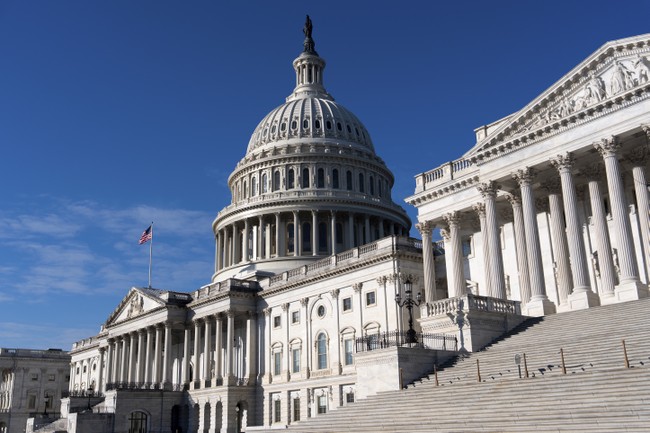
Following is the prepared testimony delivered by John Hart, Chief Executive Officer of OpenTheBooks.org, the Illinois-based non-profit watchdog that makes public official spending at all levels of government.
His testimony was delivered Tuesday, April 8, before the government efficiency subcommittee of the House Oversight and Accountability Committee, which is chaired by Rep. Marjorie Taylor Greene (R-Ga.). New Mexico Democrat Rep. Angela Stansbury is the Ranking Member.
Madame Chair Greene, Ranking Member Stansbury, and distinguished members, as we gather in this cavernous auditorium, we have an opportunity to reflect on not just the costly problem Madame Chair Greene described in her opening statement but its root cause.
Today’s expansive, excessive – and sometimes opulent – federal real estate portfolio is both a monument to the administrative state and a mausoleum of lost dreams, opportunity, and freedom for American taxpayers.
In the early 20th century, progressives like Herbert Croly dreamed of managing a complex new world with a managerial class. Croly believed in quote/unquote “increasing control over property in the public interest.” He would no doubt be pleased to see this auditorium and the administrative state’s impressive portfolio of office space.
This hearing is an opportunity for Congress to turn away from this failed policy of the past and reestablish our founders’ timeless vision for limited, constitutional government and transparency.
At Open the Books, we view transparency as a First Principle in a free society. Our work was, in part, enabled by landmark bipartisan transparency legislation, the Federal Funding Accountability and Transparency Act of 2006 – the Coburn-Obama bill – I helped craft when I was working for Senator Tom Coburn (R-Okla.). That bill created USASpending.gov and put all federal spending online for the first time.
Our founders wisely prioritized transparency and wrote it into the Constitution. Article I, Section 9, Clause 7 says that, “a regular Statement and Account of the Receipts and Expenditures of all public Money shall be published from time to time.”
Note that these words precede the Bill of Rights, the First Amendment, and our right to free speech itself. In the public square, transparency is like oxygen. We can’t speak if we can’t breathe.
When we looked at the federal real estate portfolio and opened the books, we discovered the high cost of decorating and redecorating the administrative state.
To taxpayers, today’s hearing is, quite literally, a kitchen table issue. Every family can relate to the cost of furniture. That’s why taxpayers are so incensed when they learn that federal agencies are freely spending billions of dollars every year on some high-end pieces.
Since fiscal year 2021, executive agencies have spent more than $4.6 billion on furniture alone. That amount could buy 9.2 million American families a modest $500 kitchen table. Of course, workplaces need desks, chairs, and meeting tables. And it’s true that beautiful spaces can make us more productive.
But beauty at what cost, and on whose dime?
Do federal employees need seven figures worth of abstract, modern art to make the government run? The State Department spent $1.4 million on artwork for various embassies, including $200,000 to procure a pair of custom paintings from a contemporary abstract artist.
Do they need high-end leather recliners worth thousands of dollars each? Our embassy in Islamabad is a place where you can put your feet up thanks to forty Ethan Allen chairs, which cost taxpayers $120,000.
During the peak years of the COVID emergency, from 2020 to 2022, agencies spent $3.3 billion on furniture even as work migrated to Zoom:
Meanwhile, a quote-unquote “refresh” at DARPA, the Defense Advanced Research Projects Agency, came with high-end Herman Miller furniture and a $250,000 price tag. And the SEC managed to spend $700,000 furnishing a single conference room in New York.
Social distancing guidelines failed to keep even the Centers for Disease Control from buying solar-powered picnic tables with charging ports that, by their own rules, should have sat unoccupied.
An added burden for taxpayers is that many spaces are in long-term disrepair: Federal buildings need $370 billion in fixes. All in all, we have an incomprehensible amount of physical space and furnishings, too much of it inefficiently procured, leased, and maintained.
At Open the Books, we believe taxpayers are demanding transparency and accountability. Instead of expanding federal agencies, they want Congress to expand their agency and their right to pursue happiness on their terms with their resources.
Thomas Jefferson wisely said, “The natural progress of things is for liberty to yield and government to gain ground.” Every dollar saved in Washington is a dream realized somewhere in America. The administrative state’s well-decorated real estate portfolio is a worthy place to start.
I look forward to your questions.
If you would like to view the entirety of the hearing at which Hart testified, go here.
Editor’s Note: Do you enjoy PJ Media’s conservative reporting taking on the radical left and woke media? Support our work so that we can continue to bring you the truth. Join PJ Media VIP and use the promo code FIGHT to get 60% off your VIP membership!












